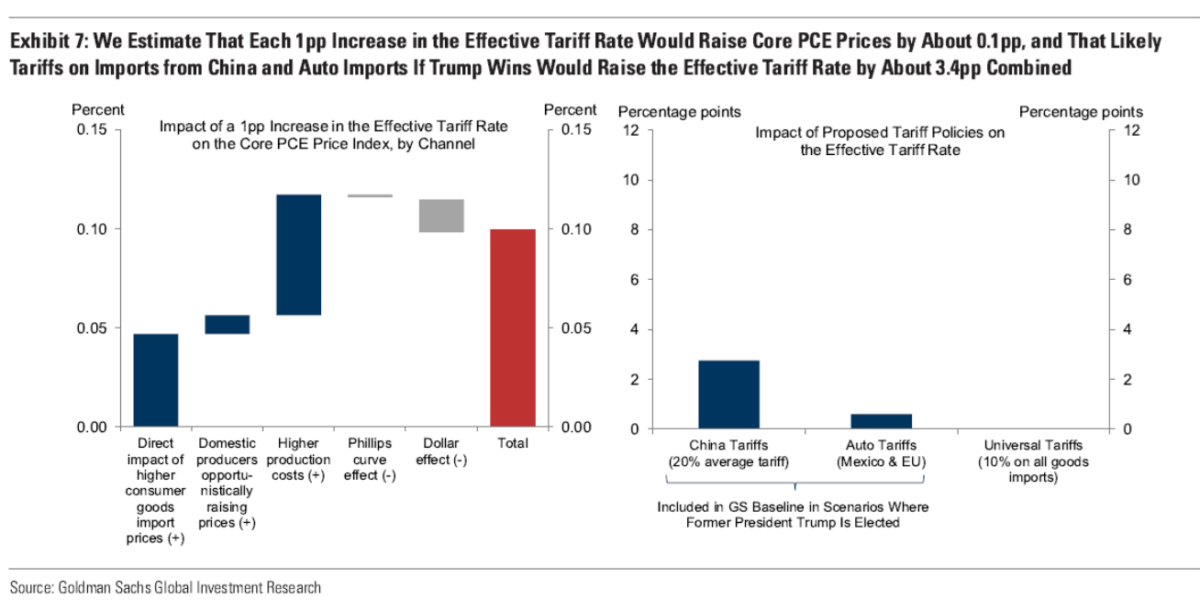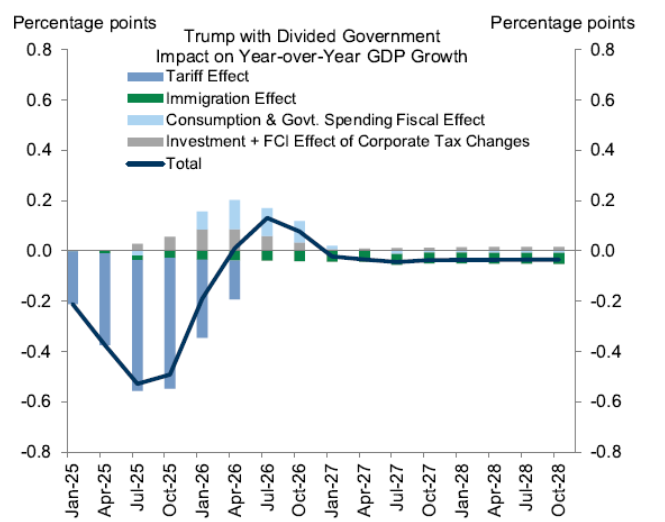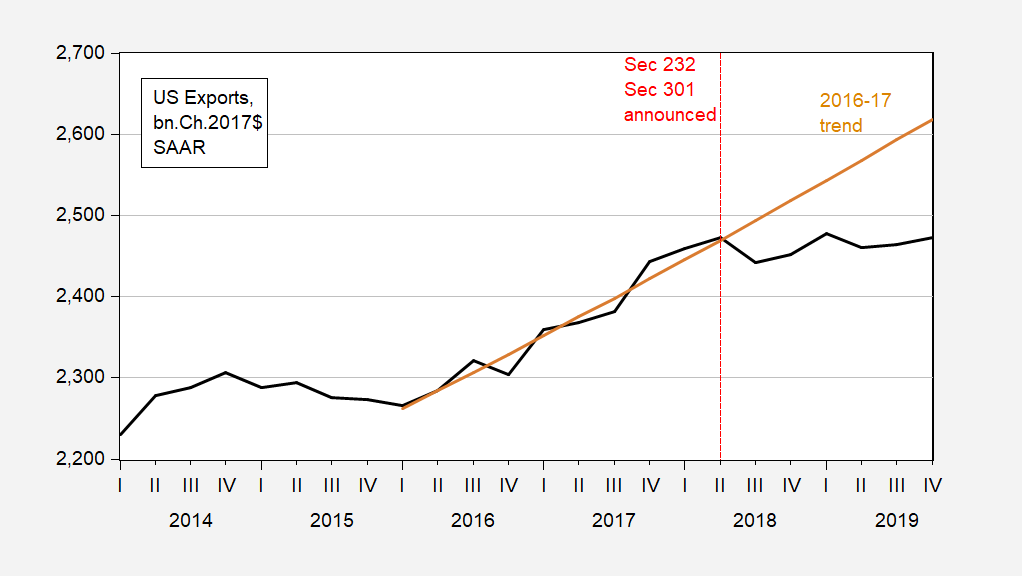Apologies to Donald Rumsfeld. There is some uncertainty regarding what parts of presidential proposals will be implemented, especially in light of the necessity for Congressional approval. However, one area where legislative approval is not required: tariffs
In the table below, see the items outlined in the red box.
Source: Alec Phillips, David Mericle and Tim Krupa, “The Election and the Economy,” (Goldman Sachs, 3 September 2024).
We have been down the Section 232 and Section 301 routes before (232 is national security, steel and aluminum last time around; 301 is market access, levied against China). Here’s the impact on effective tariffs on core PCE level.
Source: Alec Phillips, David Mericle and Tim Krupa, “The Election and the Economy,” (Goldman Sachs, 3 September 2024).
In terms of GDP, we can investigate the impact of base case for GDP, under divided government (that is, what Trump could do to tariffs without Congressional approval). See the blue bars in the below figure (all four scenarios are here).
Source: Alec Phillips, David Mericle and Tim Krupa, “The Election and the Economy,” (Goldman Sachs, 3 September 2024).
The overwhelming majority of the effect on GDP growth is due to tariffs – for which Trump 2.0 would not need Congressional authority.
What is yet more terrifying is that the analysis does not incorporate foreign country retaliation. If you don’t think there would be retaliation, then you’re smoking something… From Clausing and Obstfeld:
After the Trump Administration significantly increased tariffs on Chinese goods, China responded proportionately, reducing Chinese imports of US goods substantially.5 If countries throughout the world raise their own tariffs in response to Trump’s new tariffs, global economic headwinds will increase as the gains from trade diminish across the world. At the same time, higher import costs will entail upward price pressure, risking stagflation.
Here’s the picture of US exports of goods and services during the Trump administration (but before the pandemic-induced recession).
Figure 1: Exports of goods and services, bn.Ch.2017$ SAAR (bold black), 2016-17 log trend (tan). Source: BEA (NIPA), and author’s calculations.




Kevin Drum calls out the meek press – Trump tariff edition:
Tariffs are not as nuanced as the New York Times says
https://jabberwocking.com/tariffs-are-not-as-nuanced-as-the-new-york-times-says/
[Check out the NYTimes headline for giggles]
This highlights a problem either with journalists or with economists. I can safely say that economists aren’t “skeptical” of Trump’s tariff blather. They think it’s straight up bullshit.
So is the problem that economists are too polite to say so when a Times reporter calls? Or that the Times reporter feels an obligation to tone down what they say in order not to seem anti-Trump?
The truth is pretty simple:
Tariffs don’t “tend” to be borne by US businesses and households. They just are. They’re collected by the customs service from American importers.
Tariffs would not “likely” generate less than the trillions of dollars Trump promises. They wouldn’t, period. On net, they might even generate negative revenue.
Retaliatory tariffs wouldn’t “probably” do little to affect the dollar’s role as a reserve currency. They would almost certainly make the dollar less attractive. The whole idea of using harsh tariffs to protect the dollar is “a bit nuts,” says Brad Setser.
“Most economists” don’t say that Trump’s tariffs would increase inflation. They all do.
I understand the obligations reporters are under to appear evenhanded. Language has to be restrained. Everything has to be sourced. You can’t just state things on your own authority.
And yet, an ordinary person who managed to plow through the entire Times piece would probably come out of it thinking that tariffs are kind of complicated and it’s not really clear if Trump is right or not. This is simply not correct.
We still haven’t figured out how to cover someone who lies and blusters the way Trump does. When he says that tariffs on China are paid by China, he’s either lying or he’s a moron. That’s it. Those are the choices. But you can’t say that in the New York Times.
Evangelicals rally behind statement that hopes to combat polarization with revival
https://www.msn.com/en-us/news/politics/evangelicals-rally-behind-statement-that-hopes-to-combat-polarization-with-revival/ar-AA1qlkyy?ocid=msedgdhp&pc=U531&cvid=7e24d3f87e5c41a08965bbe4df77e166&ei=7
A group of evangelical Christians hoping to reclaim their tradition from the culture wars put out a call Monday (Sept. 9) for a broader understanding of evangelicalism urging a rejection of “political idolatry and its messengers” as well as the “false idols of power, wealth, and strength rather than the true God.” The effort, titled “Our Confession of Evangelical Conviction,” is laid out in a new religious statement unveiled last week, signed by an array of evangelical pastors and leaders. ”We reject the false teaching that anyone other than Jesus Christ has been anointed by God as our Savior, or that a Christian’s loyalty should belong to any political party,” the confession reads in part. The signers include Dan Boone, president of Trevecca Nazarene University and board chair of the Council for Christian Colleges and Universities; Raymond Chang, a pastor and head of the Asian American Christian Collaborative; and Richard Mouw, a theologian and a former president of Fuller Theological Seminary.
Congressional action isn’t needed for the actions outlined in red, but there is a legislatively-mandated procedure required to impose those sanctions. The law assumes a fair assessment and a fair assessment would limit presidential power.
I only mention this as a matter of nostalgia. Bill Barr’s theory of the presidency assumes that legislation is a polite formality with no real effect, and Trump didn’t need Barr to come up with the same view. Once upon a time, though…